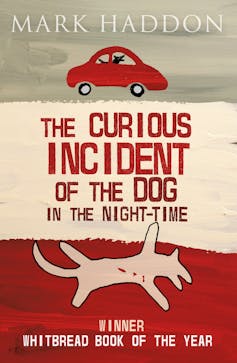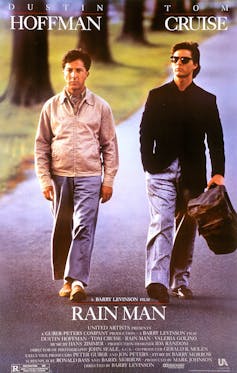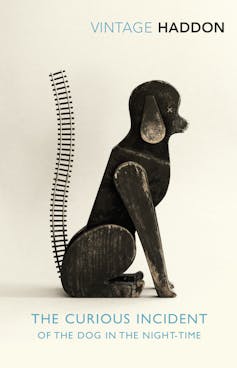
Our cultural touchstones series looks at influential books.
The Curious Incident of the Dog in the Night-time is narrated by Christopher John Francis Boone, a 15-year-old boy with Asperger’s Syndrome (a diagnosis now included in the autistic spectrum). Christopher knows “every prime number up to 7,507”, he goes to a “special school” and when he is overwhelmed, he stims to calm himself by making a noise his father calls “groaning”.

The 2003 novel, written for adults and children, was a near-instant bestseller and was even longlisted for the Booker Prize. It also won the Commonwealth Writers’ Prize for Best First Book (though this was Haddon’s 18th book, it was considered his first for adults) and the Whitbread Prize. It has sold more than ten million copies and has been translated into at least 36 languages.
In 2012, it was adapted for the stage by Simon Stephens and the play has regularly been performed around the world ever since. A new Australian production has just opened in Sydney, with an autistic actor, Daniel R. Nixon, playing Christopher.
The novel opens with Christopher mourning the death of Wellington, the neighbour’s dog, who Christopher found still warm, with a garden fork pushed through his body from one side to the other and into the ground. The neighbour, Mrs Shears, sees Christopher hugging the dead dog, assumes he was the murderer and calls the police.
Wrongly accused, Christopher decides to establish who the real murderer was because “when someone gets murdered you have to find out who did it so that they can be punished”. His father argues “It’s a bloody dog, Christopher, a bloody dog”, but Christopher insists “I think dogs are important, too.” Solving this mystery pushes him beyond his usual routines, and through the even deeper mystery of his mother’s disappearance two years prior.
Despite its enduring popularity, Curious Incident has remained controversial for a number of reasons. One is Haddon’s exploitation of the autistic community and their families.
More than Rain Man
Imagine being an autistic person or their family member in 2003. There has been nothing in popular culture raising awareness of autism since the movie Rain Man in 1988.
There are only about a dozen autistic authors. Only four of these authors are famous – and they identify as female (Temple Grandin, Donna Williams, Jasmine Lee O'Neill, and Wenn Lawson). This conflicts with the medical narrative of the time that autistics are male. So there are questions about whether these authors really are autistic, as well as whether they were actually capable of writing their books.

Then The Curious Incident of the Dog in the Night-time arrives, with a main character who is an updated, younger version of Raymond Babbitt. Instead of living in an institution, he goes to a “special school”. Instead of counting cards, he likes prime numbers. And instead of repeating “who’s on first” when he is overwhelmed, he groans. At least the book draws more attention to Christopher’s thoughts and abilities than Rain Man did. Could this prove you or your family member has thoughts and abilities too?
I was one of many family members living this thought experiment. Like many autistic women, I was undiagnosed in 2003. I had an older autistic brother but when I told people about him, most of them would inwardly – and sometimes literally – turn away. I had spent most of my life trying to get people to understand him as a person rather than a medical problem (including writing a book about him when I was seven), with little success other than during Rain Man publicity.
And now they were paying attention. For example, a Sydney Morning Herald review in 2003 described how tasks that were uneventful for non-autistic people were “monumental” for Christopher. This was a level of understanding I had rarely heard others express about people like my brother. Gerry Turcotte also described Christopher as “demanding”, which I felt was inaccurate and unfair, but some progress was better than none.
‘The thought did cross my mind’
Haddon has always claimed not to be aware of the desperation of autistic people and their families for a book about autism that would capture the public’s attention. However, he had extensive experience with autistic and disabled people, which makes this claim surprising. As he told Kate Kellaway in 2003:
He worked at an adult training centre in north London with people many of whom would now be diagnosed as autistic. […] He has friends who have children with Asperger’s; and his sister’s son has cerebral palsy.
In 2004, Haddon was asked whether he “knew or imagined that, by using a narrator with Asperger’s syndrome, you’d get a lot of publicity and headlines”? Haddon replied that he “had no idea”, although “obviously when it started to take off the thought did cross my mind”.
The word “Asperger” was on the cover of the book from the beginning. Indeed, the judges of the Whitbread and the Booker said it was why they found the book compelling. Haddon, however, said in 2009 that he “slightly” regretted this.
He also regularly described the book in that context. Here he is in The Guardian in 2004: “Three years ago, I wrote The Curious Incident of the Dog in the Night-Time, a novel set in Swindon about a teenage boy with Asperger’s syndrome who discovers a murdered poodle on a neighbour’s lawn.”
Autistic representation
Haddon knows “very little about the subject” and deliberately “did no research”, beyond reading an article by Oliver Sacks about Temple Grandin and “a handful of newspaper and magazine articles about, or by, people with asperger’s and autism”.
While he says he is not an expert, he doesn’t seem to direct people to the real experts – autistic people. By contrast, Graeme Simsion, the author of the bestselling Rosie Project series of novels, about eccentric autistic genetics professor Don Tillman, regularly promotes autistic authors, and uses his platform to be an ally to autistic people.
Later Haddon began claiming that the novel wasn’t about autism. In 2009, Haddon said labels were not important. Did he think Christopher’s autism could be deleted if the label was taken away? And he still continues to say the book is about “difference”, not disability.
“As the writer I’d like to stand up for Curious as a work of fiction, pure and simple,” he told The Big Issue in 2016. “And Christopher himself? I like to describe him using his own phrase – ‘a young mathematician with some behavioural issues’”.
Of course, in real life, a person does not become autistic the moment a doctor declares it so. A person is born autistic. And if they do not have the autism label, they are given many others. Ironically, this happens to Christopher. He is sitting on a train, minding his own business, when a man in a suit walks up to him and says “You are fucking weird, mate”.
Offensive for the wrong reasons
Curious Incident has also been controversial for its frequent use of “offensive language”, in a book that is read by teenagers. This has led to it being banned from more than one school reading list in the US.
“What in fuck’s name have you done to my dog?”, Mrs Shears shouts. “Holy fucking Jesus, Christopher. How stupid are you?” Christopher’s father shouts. “Jesus, Christopher, I am seriously considering putting you in a home,” Christopher’s mother shouts. But the concern of most non-autistic people seems to be about the language itself, rather than the way it is used – and its effect on Christopher, which should be a much bigger concern.

No one seems to consider that Christopher’s poor treatment might be the cause of his “Behavioural Problems”. Throughout the novel, Christopher is blamed for events that are not his fault, shouted at, threatened and physically abused. This environment would traumatise any child, and is still more likely to traumatise autistic children. But Christopher’s reactions are just added to the list of things for which he is to blame. In this respect, Curious Incident is tragically accurate.
However, it seems Haddon did not write these incidents out of concern that autistic children are two to three times more likely to be abused than non-autistic children – he wrote them because they amused him. As he explained in 2014: “because Christopher is largely deaf to tone and subtext he is utterly oblivious to the intended effect of ‘bad language’ and it has absolutely no power to offend him. I find this funny.”
The idea autistic people are unaware of subtext is a dangerous myth. Autistic people are as aware of context as non-autistic people, though each group is likely to note or prioritise different elements of the same context. Autistic researcher Damian Milton has named this “the double empathy problem”. It can result in autistic people not noticing when a non-autistic person is communicating anger. Equally it can also result in an autistic person’s response to anger going unnoticed by non-autistic people.
Even if we assume Christopher is completely unaware of what offensive words mean in themselves, he is very aware those words are shouted at him. This shouting frightens him – as he clearly says at the beginning of the book: “I do not like people shouting at me. It makes me scared that they are going to hit me or touch me and I do not know what is going to happen.”
20 years of progress
In better news, autistic people have found a way to benefit from Curious Incident through its on-stage productions. In 2017, Mickey Rowe was the first autistic-identified actor to play Christopher. This paved the way for the autistic community to claim the role and reshape it. For example, in a 2023 production, the main character was named Chris, and played by an autistic woman. Now Australia continues this tradition.
Though Curious Incident is a reminder that the abuse and misunderstanding of autistic children is still a significant issue, its incorporation of autistic actors also demonstrates the profound influence and progress of the autistic movement during the last 20 years. This same progress has meant, in 2024, readers who want to understand autism can choose from a huge number of autistic authors, writing in every genre.
Amanda Tink does not work for, consult, own shares in or receive funding from any company or organisation that would benefit from this article, and has disclosed no relevant affiliations beyond their academic appointment.
This article was originally published on The Conversation. Read the original article.







